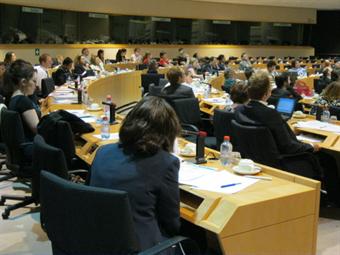
The Science of Naturalliance in the European Parliament
In 2010, organisations in Naturalliance searched the internet for models that could be used to forecast change in the riches of nature. There were more than 2000 models, but less than 4% were suitable for use at a local scale by ordinary farmers, foresters, gardeners and managers of land for fishing, hunting and other species conservation. Of those models, almost all were only in English. There was little attempt to join them up in a holistic way. They did not use the large databases such as the map, which is managed by European Environment Agency, of habitats in 250m x 250 m squares across Europe.
Yet there is much mapping of habitats at finer scale by local managers of land, and mapping of species by scientists and conservation volunteers. The Science Best Practice page shows one mapped by scouts. Such maps could be joined up to predict change in species, and hence the riches of nature, across wide areas. A main aim of Naturalliance is to encourage map-based local decision support to be exchanged for the maps that people create to get that support. Those maps can then be joined up to build a GIS that can support policy at high levels. Our vision is to help all involved, whether as owners, managers, government or citizens, to benefit from natural riches and hence conserve them. For this to work long term, we need also to help the scientists, who provide data and models that can be used for decision support, to gain recognition and funding.
PRODUCTION. In order to build a bridge between science and social benefit from species and land, the models will need to include or link easily to economics.
PROBLEM-SOLVING. Models will need to be based on mechanisms and reflect causal relationships; citizen-science can expand the human resources to build and test models at the scale of landscapes and communities; your challenge is to guide and plan that work.
MAPPING of habitats is essential for spatially-specific models. The Naturalliance mapper, based originally in wildlife research is intended as a public resource for helping to build and use models.
Please REGISTER, to help us help you to:
• See your data and models used to benefit society and the riches of nature;
• Gain support for work that will benefit the natural environment and your career;
• Plan experiments at landscape and community scales to understand causality and improve prediction.
When you register, you can complete our SURVEY to tell us your main interest areas.